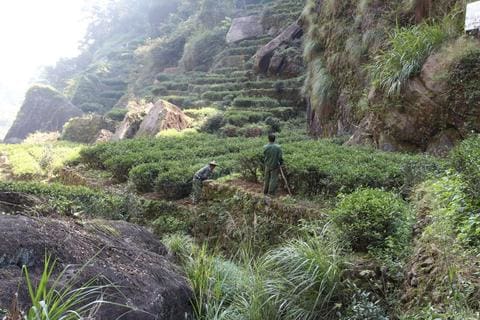
Tea Tasting Guide: How to Taste and Appreciate Wuyi Rock Oolongs
岩骨花香
(yan gu hua xiang)
floral fragrance, rock bone

Wuyi rock oolongs might be some of the most difficult teas to craft in the world. Each of them requires careful attention from the tea master. Too much oxidation, for example, will destroy the complex flavor altogether, but too little never manages to bring it out, leaving the tea leaves greener in color and weaker in taste.
Even with the same cultivar, subtle changes in terroir from one area in the Wuyi Mountain Range to the next can result in drastically different aromatic profiles. This is most notable with the variety of Shui Xian available in the market. Some taste weak, inferior, even cheap, while others are roasted so heavily that they are unrecognizable. Finding a good one requires not just establishing a relationship with an expert tea master but also locating a superior growing area, one whose terroir will amplify everything the tea has to offer.
Between roasting and terroir, then, you have two of the most important ingredients that make the difference between an inferior Wuyi rock oolong and a superior one.
But how can you tell the difference? What do are you looking for?
What is a Wuyi rock oolong supposed to taste like?
Distinguishing between the varietals of Wuyi oolongs is no easy feat. It takes time, patience, scrupulous notetaking, and frequent tasting. To an unrefined palate, identifying a cup of Rou Gui from Bai Rui Xiang or Shui Jin Gui is little more than luck.

Fortunately, you don’t have to be able to do this to enjoy a Wuyi yancha. Rather, there are some general characteristics to look for when sipping these oolongs, characteristics that are easy to identify as long as you know what they are.
Perhaps one of the most important traits of a rock oolong is an unusual one known as yan yun (岩韵). Literally translated as “rock- or cliff-rhyme,” this is used to describe the distinctive aftertaste of yancha. Owing exclusively to its terroir, yan yun is an almost effervescent sensation that arises in the mouth before moving up through the nose and into the back of the throat.
Yan yun feels like a gentle tingling or tickling sensation, similar what occurs when drinking a carbonated beverage. For the locals, it is yan yun that determines the quality of a rock oolong, for this characteristic alone is what captures the spirit of this rocky terrain, reminding one of the misty waterfalls and babbling streams.
Accompanying yan yun are yan gu (岩骨) and hua (花), that is, “rock” and “floral” aromatics, respectively.
The rock (or, lit. rock bones) is the characteristic of the oolong that is derived exclusively from the terroir. This gives the tea a heartiness to it, an almost broth-like or meaty quality. These are the heavier tasting notes and richer sensations, usually accompanied by flavors such as dark chocolate, minerality, roasted fruits, smokiness.

In the mouth, yan gu presents as a drying sensation, a quick evaporation that unfolds into the yan yun described above. It is yan gu that is known as the “rhythm of the rocks,” the defining flavors that will slowly mellow out but persist over many infusions.
But even though the rockiness of yan gu ultimately makes a rock oolong a rock oolong, it’s still incomplete without hua.
A good yancha must be balanced, and the only way to balance the heavy flavors and drying sensations are with lighter flavors and cooling sensations. This is the work of hua.
Hua usually presents with floral notes—orchid, daffodil, pine, elderflower, even rose. This fragrance, however, should not be overwhelming; rather, in the well-crafted yancha, it is slow to develop, subtle to the nose.
This is why we say: “floral fragrance, rock bone” (岩骨花香).
The yan gu is what makes the tea a rock oolong, but it is the hua that makes it a superior rock oolong. The yan yun is the sensory treat that remains after sipping one of these quality yancha. It will leave you feeling satisfied, delighted, excited, filled with a zest for life that echoes the rich and diverse environment of the Wuyi Mountain Range.